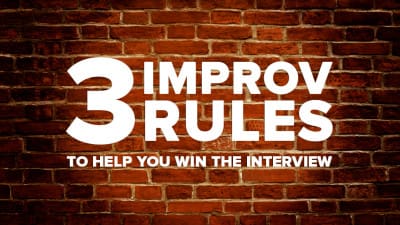The world of improv comedy—think Whose Line is it Anyway, Second City, UCB—is famous for more than just kicking out hilarious performances. Certain techniques derived from improv are used for managing employees, developing business ideas and even landing a job.
So if you’ve got a job interview on the horizon, check out these improv techniques to see how they can help you bring down the house—or at the very least win over the hiring manager.
Also on Mediabistro


1. Say “Yes, and…”
One of the founding rules of improv is the “Yes, and…” technique. The basic idea is that improvisers should agree to the world of the scene and build onto it. So for example:
Actor A: I can’t believe this Megabus is going to be six more hours to Denver!
Actor B: Yes, and do they really need to keep playing Snakes on a Plane? Is that the only DVD they brought?
Cassie Ahiers, instructor at The Revival theater in Chicago and creator/director of the comedy web series Lake Effect, says using “Yes, and…” in an interview reminds a job candidate to go further with their responses. “With ‘yes’ you are supporting the idea that you are an experienced candidate,” says Ahiers, “and it’s with the ‘and’ where you get to expand upon your skills.”
So, let’s say an interviewer asks you if you’re comfortable using a CMS. You might reply:
Yes, I’m very comfortable using Drupal and WordPress, and I lead a session at my previous job training staff on best practices in tagging and optimizing content for SEO in content management systems.
2. Fully Listen
Too quick to respond with a funny line, a common trait of the newbie improviser, is a failure to fully listen to the other actors in the scene:
Actor A: We’ve got to get this boat back to the harbor, or my dad’s going find out we took it—
Actor B: This car is fast!
And novice improvisers aren’t the only ones with this problem. In an interview, when you’re full of nerves, the all-too-common result is you respond too quickly without taking the time to fully listen to the interviewer—or worse, you interrupt them.
“Listening to understand, not just to respond, is the most important skill in communication,” says Ahiers. Taking the time to fully understand what is being asked not only allows an interviewee to develop the best possible answer, it also shows that he is fully invested in the conversation and the needs of the company.
3. Make Your Partner Look Good
Another very important tenet of improv is making your scene partner look good. This means supporting their decisions in the scene, buying into the world they’re creating and helping them out if they’re drawing a blank on where to take the story. It’s an idea that translates seamlessly to the interview.
If a hiring manager asks something like, “Give me an example of a team project that failed,” you can take this technique into account, sharing your difficult situation and explaining how you supported the team while doing everything in your power to help everybody come out on top.
Here’s a few more interview queries in which you can weave in your ability to support the team, making everyone look good:
- “Describe a project that required collaboration across teams.”
- “Share a time when you worked with a difficult team member.”
- “Tell me about a rewarding team experience.”
By showing you understand the importance of supporting the team, you work to establish yourself as a strong candidate, as teamwork is absolutely essential in any work environment.
Ready to hone these and other techniques so you can nail your next interview? This calls for a mock interview: Refine your skills in a one-on-one session with a Mediabistro career counselor and learn how to talk about your work history and answer tough questions, anxiety free.











